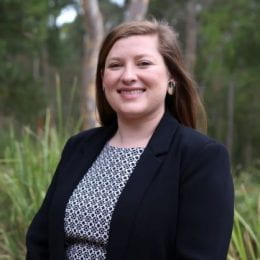
Dr. Kelsey McDonough, who earned her PhD in biological and agricultural engineering from K-State in 2018, has always been drawn towards developing innovative challenges.
She firmly believes that pursuing her doctoral degree led to her successful career today. McDonough currently works as a Senior Flood Engineer for FloodMapp – a technology company specializing in rapid flood forecasting and inundation mapping to provide greater warning time and awareness.
“In my career today, I get to pursue novel, groundbreaking research working in a technology start-up solving some of the greatest hydrology challenges to build a safer and better future,” McDonough said.
To get to where she is today, McDonough decided she needed to take a route that involved pursuing a graduate degree.
She decided to become a graduate student after completing an REU during the summer of 2013 at Kansas State called “Climate Change and Mitigation.”
“I was studying biological engineering at NCSU at the time and went out to Kansas for that summer for the first time ever,” McDonough said.
In 2015, McDonough was one of 10 students selected from the Midwest region to participate in the fifth annual RDG Design Residency, which was an eye-opener to career possibilities beyond academia.
“There are so many cool and creative career opportunities post-PhD that aren’t well highlighted or communicated as career options when you are in graduate school,” she said. “While in graduate school, it often felt like the only career choice post-PhD was research and academia. RDG was the first step to me exploring what else was out there for me, beyond research and academia.”
After graduating from K-State, she moved to Germany to work as a Postdoctoral Research Scientist in the Professorship for Ecosystem Services at the University of Bayreuth.
While in Germany, she was awarded a Fulbright Postdoctoral Scholarship to the University of Newcastle in Newcastle, Australia, which she had applied for while finishing her PhD at KSU.
The focus of McDonough’s Fulbright postdoctoral work was to study and quantify the ecosystem service contributions in the Macquarie Marshes, a Ramsar-listed wetland in the Murray-Darling Basin of Australia.
McDonough moved to Australia in January 2020 for what was supposed to be a 10-month period. Unfortunately, with the Covid pandemic, the U.S. State Department cancelled State Department funded programs in March.
“I was shipped back to the United States and completed some of my research remotely – at least what could be done from that distance,” she said.
In October of that same year, McDonough began working with Advanced Environmental Monitoring (AEM) in Colorado, leading a professional services team in the rollout of operational flood forecasting solutions to provide real-time flood insights to users around the world.
From there, she joined FloodMapp.
“My goal while at KSU was to complete my PhD and pursue a career in academia,” she said. “While that didn’t exactly pan out as I had planned it, I think the way that my career has evolved was perfect for me. I had the incredible opportunity to move overseas for two postdocs – Australia and Germany – which fulfilled a lifelong goal of mine to live and work overseas.”
While McDonough relied on the interdisciplinary network of professors, from biological and agricultural engineering, to statistics, to sociology, to guide her towards the answers to her research questions, she also contributes her success to the community life she experienced among the close-knit group of researchers in her graduate program. She saw them as more than willing to help support their students in their goals and pursue the answers to their scientific questions.
“I would strongly encourage anyone considering KSU for graduate school to consider it as a top contender. While I may have moved on from Manhattan, I still think of my time at KSU fondly and have some of the best memories of my life there,” she said.
“For current KSU graduate students, I would encourage you to get involved!” said McDonough. “There is so much more to graduate school than what is just going on inside your lab or department. Engaging with others outside of your department and interacting with new or different ways of thinking can be both a great stress relief and inspiration to solving your latest research challenge. You never know who you will meet, what opportunities may come your way, or what skills you’ll pick up that may be the key to your graduate school and career success.”